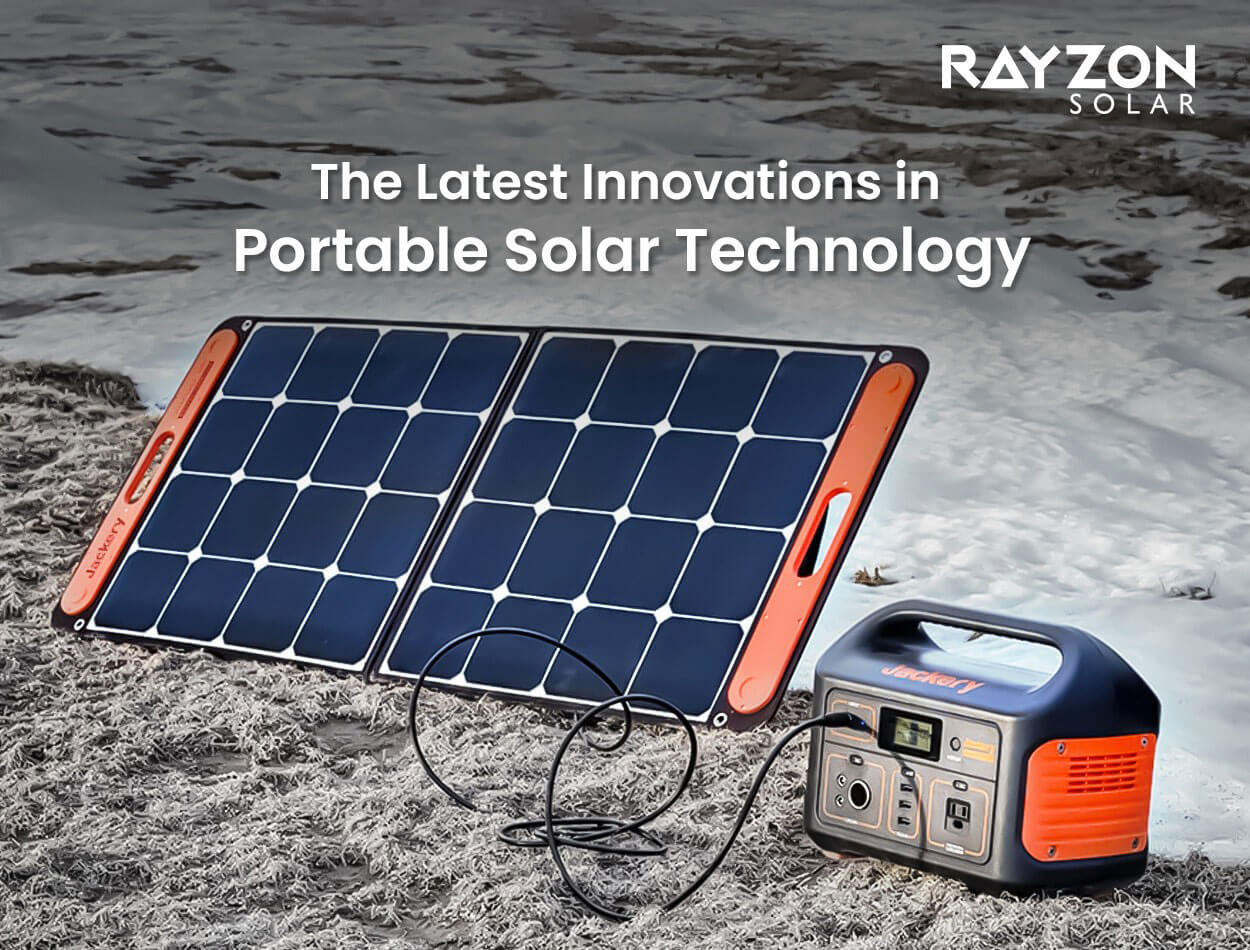
The Latest Innovations in Portable Solar Technology
As the world increasingly turns to renewable energy sources, portable solar technology has garnered significant attention. These devices offer flexibility and sustainability, making them essential for various applications such as outdoor activities, emergency preparation, and off-grid living. This blog explores the latest innovations in portable solar technology, examining how advancements in this field are shaping the future of energy consumption.
Understanding Portable Solar Technology
Portable solar technology refers to the design and use of compact, lightweight solar panels that can be easily transported and deployed. These systems are equipped with solar cells that convert sunlight into electricity, making them ideal for remote locations, outdoor activities, and emergencies. The integration of photovoltaic technology in portable formats has opened new avenues for solar power applications, enhancing accessibility to clean energy.
Evolution of Portable Solar Technology
Historical Background of Portable Solar Devices
The journey of portable solar technology started with the invention of the photovoltaic (PV) cell in 1954 by Bell Labs. Early portable solar devices were primarily used in space applications, providing power for satellites. These initial applications highlighted the potential of solar energy but also revealed significant limitations, such as low efficiency and high costs.
Early Applications and Limitations
Portable solar technology initially found use in role markets, such as powering calculators and small electronic devices. However, the efficiency of early solar cells was limited, and the high cost of production restricted widespread adoption. The bulky design of early solar panels also posed challenges for portability and usability.
Key Advancements Driving Innovation
Recent years have seen substantial advancements in portable solar technology. Innovations in solar cell materials, design, and integration have driven this evolution. For example, the development of thin-film and perovskite solar cells has significantly improved efficiency and reduced costs. Additionally, advancements in battery technology have enhanced the storage capabilities of portable solar devices, making them more practical for everyday use.
Read More: Thin-Film Solar Cell Technology
Types of Portable Solar Devices
Solar Chargers for Phones, Laptops, and Other Electronics
One of the most popular types of portable solar devices is solar chargers. These devices are designed to charge phones, laptops, and other electronics on the go. The best solar Provider offers high-efficiency solar chargers that are compact and lightweight, making them ideal for outdoor fans and travellers.
Portable Solar Panels and Foldable Solar Arrays
Portable solar panels and foldable solar arrays provide a multipurpose solution for generating power in remote locations. These panels can be easily transported and set up, offering a reliable power source for camping, hiking, and off-grid living. Top solar companies have developed innovative designs that maximize efficiency while maintaining portability.
Solar-powered generators and Power Banks
Solar-powered generators and power banks are essential for emergency preparation and off-grid living. These devices store energy generated by solar panels, providing a reliable power source when traditional electricity is unavailable. Leading solar panel manufacturers have developed generators with advanced features such as multiple output ports and fast charging capabilities.
Solar Backpacks, Tents, and Other Integrated Products
Integrating solar technology into everyday items, such as backpacks and tents, has opened new possibilities for portable solar devices. These products incorporate flexible solar panels, allowing users to generate power while on the move. This innovation has been particularly beneficial for outdoor enthusiasts and professionals working in remote areas.
Cutting-edge innovations in Portable Solar Technology
Advanced Solar Cells
The development of new types of solar cells, such as perovskite and thin-film cells, has revolutionized portable solar technology. These cells offer higher efficiency and better performance in low-light conditions compared to traditional silicon-based cells. Rayzon Solar The best solar panel company in India, for instance, has integrated these advanced cells into their products, making them more efficient and cost-effective.
Read More:Perovskite Solar Cell
Efficiency Improvements
Efficiency improvements in solar cells have had a significant impact on portable devices. The most efficient solar panels can now convert a higher percentage of sunlight into usable energy, reducing the size and weight of portable solar devices. This advancement has made it possible to create more compact and lightweight products without compromising on performance.
Enhanced Portability and Design
Innovations in materials and design have led to the development of lightweight and compact portable solar devices. Foldable, relabelled, and flexible solar panels offer unmatched portability, making them ideal for a wide range of applications. These designs not only enhance usability but also ensure that solar technology can be seamlessly integrated into everyday life.
Smart Features and Connectivity
The integration of smart features and connectivity has further enhanced the functionality of portable solar devices. IoT-enabled solar devices allow users to monitor and control their power generation and consumption remotely. Smartphone apps provide real-time data on energy production and usage, helping users optimize their solar systems. Additionally, compatibility with smart home systems and devices has made it easier to incorporate portable solar technology into modern living environments.
Applications and Use Cases
Outdoor Adventures
Portable solar chargers and panels have become crucial for outdoor adventures such as camping, hiking, and backpacking. They provide a reliable power source for charging electronic devices and powering small appliances. Case studies and user testimonials highlight the convenience and practicality of these devices in real-world applications.
Emergency Preparedness
In times of natural adversities and emergencies, having a reliable power source is crucial. Portable solar devices offer a sustainable solution for providing essential power during such situations. They can be used to charge communication devices, power medical equipment, and provide lighting, ensuring that individuals and communities remain connected and safe.
Off-Grid Living and Developing Regions
Portable solar technology plays a dynamic role in off-grid living and providing electricity to developing regions. These devices offer a sustainable and cost-effective solution for communities that lack access to traditional power grids. By harnessing solar energy, these regions can improve their quality of life and reduce their dependence on fossil fuels.
Read More: Off-Grid Solar System and On-Grid Solar System
Environmental and Economic Benefits
Sustainability
The use of portable solar devices contributes to sustainability by reducing reliance on fossil fuels and lowering carbon emissions. As a renewable resource, solar energy is plentiful and environmentally friendly. By adopting solar technology, individuals and businesses can contribute to global efforts to combat climate change and promote green energy.
Cost-Effectiveness
Portable solar devices offer long-term savings on energy bills and a good return on investment (ROI). The initial cost of purchasing these devices is offset by the savings generated from reduced dependence on traditional power sources. Additionally, as the cost of solar technology continues to decrease, it becomes an increasingly sustainable option for consumers and businesses.
Conclusion
Portable solar technology has come a long way from its early beginnings, thanks to significant advancements in materials, design, and smart features. These innovations have made portable solar devices more efficient, practical, and accessible for a wide range of applications. As the world continues to embrace renewable energy sources, the future of portable solar technology looks promising, with expected trends and innovations set to further revolutionize this field. For those interested in exploring or adopting portable solar solutions, now is the perfect time to invest in this sustainable and cost-effective technology.
You Can Also Read This: The Future of Solar Energy Grid Integration



